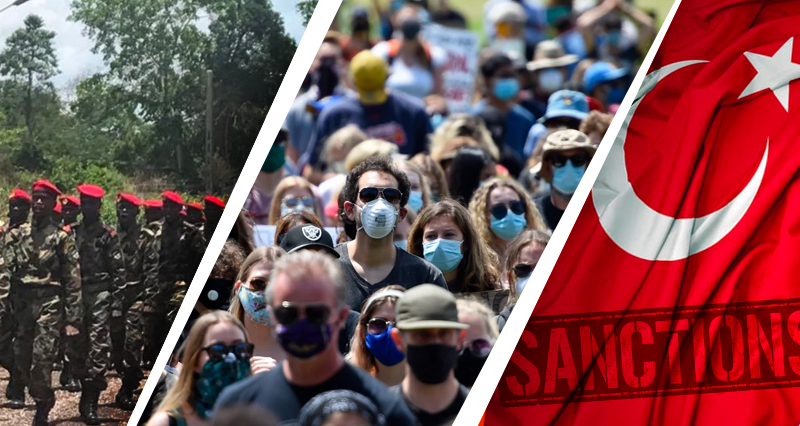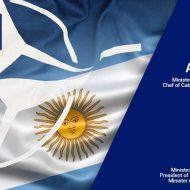Unrest in Central African Republic: French intervention?
Major unrest has erupted in the Central African Republic as rebel forces advancing on the Central African Republic’s capital, Bangui, have been pushed back. The UN said Sunday that after a destabilisation phase, the situation was back “under control”: Vladimir Monteiro, spokesman for the UN’s MINUSCA peacekeeping force told AFP on Sunday that “armed groups have left the town” of Yaloke, on one route towards Bangui, and that they had surrendered in two other areas.
Tensions have risen in the country just a week before key December 27 presidential and legislative elections.
The government claimed a coup attempt was occurring this week when it was reported that three powerful armed groups in control of much of the country had begun advancing towards the capital along the main roads.
On Sunday, the Coalition of Democratic Opposition (COD-2020) called for the vote to be postponed until peace and security are restored. COD-2020 brought together the main parties and movements opposed to President Faustin-Archange Touadera. The opposition coalition COD-2020, led by pro-French politician Anicet-Georges Dologuélé, is deliberately pouring fuel on the fire in order to act in France’s interests.
The government has blamed ex-President Francois Bozizé for the destabilisation, although he himself has denied any involvement in the march on the capital.
The government also claimed on Saturday that Bozizé was in Bossembele with fighters from three rebel groups who announced on Saturday a coalition called the Coalition of Patriots for Change (CPC).
Bozizé‘s KNK party denied the former leader wanted to carry out a putsch. “We categorically deny that Bozize is at the origin of anything,” party spokesman Christian Guenebem told AFP.
According to some reports, some of the armed groups are still in the area around Bossembele, about 90 miles from Bangui, information updated regularly.
In a joint statement, the group, which included France, Russia, the US, the EU and the World Bank, called on Bozizé and allied armed groups to lay down their arms, calling for elections to be held on December 27. MINUSCA’s 11,000-strong force warned on Saturday that it would use all means at its disposal, including aircraft.
Bozizé, who returned after years in exile, was barred from contesting the elections by the country’s court as the CAR sought him out with an international arrest warrant. He was ousted in 2013, after which France intervened in the former colony.
The conflict is defined by several factors at once: first of all, French intervention and an attempt to control the situation in the country as is convenient for Paris.
France still considers the country a colony and in addition to the actual military interventions has been conducting active information campaigns.
Last week, it became known that Facebook management has blocked about 200,000 pages of users from the Central African Republic. The moderators attributed this to the fact that their platform was being used by outside agents (French and Russians) to promote a number of candidates in the upcoming elections. According to social media reports, French Ministry of Defense officials have used the social network to influence public opinion in the CAR, as well as managing dozens of Facebook and Instagram pages.
On December 18, this led to a mass rally in which Facebook users protested against the blocking of their accounts by the social network’s management.
The same social networks under French control are largely responsible for fueling local conflicts.
In short, the French are already blatantly conducting information campaigns in African countries and presenting small skirmishes as an offensive against government forces. Paris is trying to create an atmosphere of instability in the country on the eve of elections. In this way France, with no other pro-French proxies, is trying to maintain influence through controlled chaos, escalating the situation to the brink of civil war. Bozizé, although no longer an active politician in the CAR, is still trying to reap the benefits of a situation of destabilization in the country.
The CAR is one of the poorest and most unstable countries in Africa, despite being rich in resources such as diamonds and uranium. For this reason (as well as geopolitical influence on the region) France is desperate to maintain control.
It is expected that these events may aggravate French-Russian tensions in Africa as on December 21 the CAR’s leadership turned to the Russian Federation and Rwanda for help in securing elections.
COVID-19 spreads across Europe
More than 20 countries have imposed flight restrictions due to a new coronavirus: new mutations of Covid-19 have been found in several countries including the UK, Australia, the Netherlands, Denmark and South Africa. The South African Ministry of Health believes the second wave of COVID-19 in the country is caused by this variant of the virus. According to preliminary data, the new variant of the coronavirus is more contagious and affects young people without comorbidities more severely.
Due to the new conditions, a number of countries have already closed flights from at least the UK. Some countries, including Saudi Arabia, have closed their borders.
Leading German virologist Christian Drosten has said that he expects the new strain of Covid-19 found in the UK to be in circulation in Germany, although this has not yet been officially confirmed. Germany has banned all passenger flights from the UK to Germany since midnight on Sunday, with the country’s federal police warning that people should only travel to the UK “if absolutely necessary”.
Meanwhile, French president Emmanuel Macron has been infected with the coronavirus: it is possible that other European leaders could have been infected after the EU summit in December.
Meanwhile, coronavirus measures have put the already difficult, deadlocked Brexit negotiations on hold. Previously, the parties were going to prepare an agreement by Monday, December 21. Because of this, they will have to live without an agreement for the first few weeks after the UK leaves the European Union.
All this will affect the economy, politics and geopolitics of entire regions for many months to come, as Covid-19 will not disappear in the short term, but continue to mutate. Against this backdrop, there is a growing race by countries to release vaccines against the infection.
Sanctions against Turkey
The US has imposed sanctions against Turkey on the pretext that Ankara had previously purchased S-400s from Russia. The sanctions, coming under the Countering America’s Adversaries Through Sanctions Act (CAATSA), target Turkey’s Defense Industries Presidency (SSB), including Ismail Demir, the head of the SSB, and three other officials.
Those who threaten Turkey with sanctions will end up disappointed, the country’s president said on Saturday.
“We are determined to put across that Turkey will never hesitate to use its sovereign rights,” Recep Tayyip Erdoğan said at a highway opening. The president stressed that the Americans had tried to confront Turkey by all means, such as using terrorist groups, coup attempts, political and economic traps and sanctions, but had been unsuccessful.
Erdoğan stressed that Turkey can work with those who treat it with respect and fairness: “We leave the door open for those who are ready to sit and talk with us on equal terms and agree with fair offers.”
As the necessary infrastructure investments are completed for a powerful Turkey, it is increasingly becoming a magnet for domestic and international investors, Erdoğan said. The biggest proof of this, he said, is that Turkey has attracted $220 billion in international investment and 30 new airports have been opened.
“As always, we will continue to be on the side of common sense, in line with the interests of our nation. We are not afraid of [US’s unilateral] sanction. Turkey does not [need] to be discouraged by any sanction,” Vice President Fuat Oktay told lawmakers in his closing speech while debating the 2021 budget in the parliament.
US officials opposed the deal, saying the S-400s would be incompatible with NATO systems and would expose F-35 aircraft to a possible Russian ploy. Turkey, however, stressed that the S-400s would not be integrated into NATO systems anyway and pose no threat to the alliance or its weapons.
Most importantly, however, is the fact that Turkey is not giving in to US blackmail this time and is defending its sovereign interests. Erdoğan showed himself to be a pragmatic leader in his statement. If the US continues its pressure, it will only benefit Turkey because talk of leaving NATO, an organisation that brings no benefit to Ankara, will resume.
US: Electoral college vote
On December 14 the Electoral College of the US voted. According to the results, Democrat Joe Biden can be officially declared President-elect of the United States, and Kamala Harris vice president.
Biden had the support of 302 electors while Trump had the support of 232. The minimum needed to win was 270 votes. Biden surpassed that level when the votes of California’s electors were counted.
Thus, if President Donald Trump’s lawsuits over election fraud are not successful, Biden will take office as the 46th president of the United States on January 20 during the inauguration ceremony.
However, Trump and his supporters are not giving up. In addition to Trump’s lawyers trying to deal with fraud through the courts, the president’s team has launched an awareness campaign – Fight for Trump.
Biden is not officially president and changes are possible after the trials.
Kashmir
The conflict in Kashmir has flared up again, with India and Pakistan mutually accusing each other of violating the ceasefire agreement.
Pakistan’s position is that India attempted a provocative false flag operation. The Pakistani military was on high alert in Kashmir while the country’s prime minister warned India against conducting any false flag operations in the disputed region after a UN vehicle was attacked on December 18.
Pakistan accused India of Friday’s attack, implying that it was aimed at embarrassing Islamabad and damaging relations with the international community.
India has denied the allegations. The two UN observers in the car escaped unharmed.
Anurag Srivastava, a spokesman for India’s Ministry of External Affairs, said Pakistan’s allegations were investigated in detail and found to be factually incorrect and false. He said Indian troops were aware of the presence of UN observers and did not open fire.
The ceasefire agreement in Kashmir between India and Pakistan has been in force since 1999. According to the Indian military, about 30 civilians have been killed and more than 100 injured as a result of more than 3,200 ceasefire violations by Pakistan in Kashmir in 2020.
The two nuclear-armed countries are bitter rivals, having fought three wars since independence from British rule in 1947.









Leave a Reply